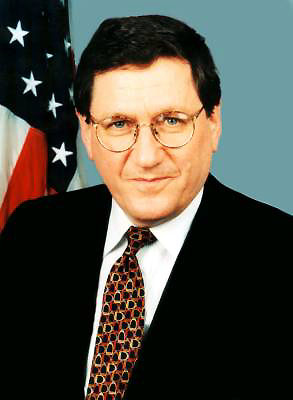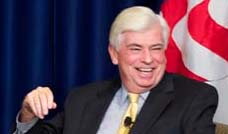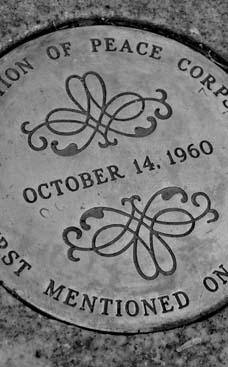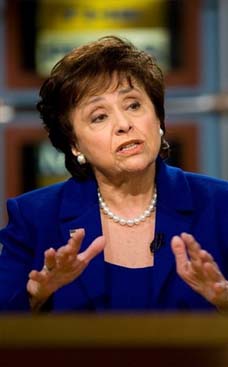
"I think Dick had taken the Peace Corps job as a breather. He had come to it from the pressure cooker of Saigon in the late Vietnam War years and had been a key member of the U.S. peace talks team in Paris. Later, as I mainly lost touch with him, he went as ambassador to Bonn, where he welded fast the U.S.' anchor relationship with Germany, and as U.N. ambassador to New York, where his efforts led, among other things, to a reluctant U.S. government's payment of its full back dues to the world organization. To my mind, it was the morass of Afghanistan and Pakistan that pulled him under. Not the punishing, endless round of flights between Kabul, Islamabad, Washington, and points in Europe. Not that. He was tough. Rather, the swarming impossibility of reducing chaos to order when many of the people he dealt with preferred chaos. That, and the clam-tight stubbornness of a culture and a terrain that no outsider has ever penetrated and held onto." Richard Holbrooke, Special Representative for Afghanistan and Pakistan under the Obama administration, is a top-ranking American diplomat, magazine editor, author, professor, and investment banker who served as Country director for Peace Corps Morocco between 1970 and 1972.
Richard Reid writes: I was nominally Dick Holbrooke's boss for a year as I ran a Peace Corps regional operations desk from Washington, but I doubt that anyone was ever able to really boss Holbrooke for long
Richard Holbrooke and Afghanistan
Wednesday, December 22, 2010
RICHARD REID
When Dick Holbrooke died of a ruptured aorta last week, he took with him an irretrievable cache of method and foreknowledge. With him went an unmatched feel for the quirks and bottom lines of just about all of the world's main power brokers. In getting what he wanted at the bargaining table, he mixed gall, charm, and a poker bluffer's sublety. He was a force of nature.
President Obama will give another capable someone Holbrooke's title, but no one will replace him. For at least the past two decades he was the United States' most effective diplomat. Historians will mention him alongside George Marshall, George Kennan, Dean Acheson, and Henry Kissinger.
To my mind, it was the morass of Afghanistan and Pakistan that pulled him under. Not the punishing, endless round of flights between Kabul, Islamabad, Washington, and points in Europe. Not that. He was tough. Rather, the swarming impossibility of reducing chaos to order when many of the people he dealt with preferred chaos. That, and the clam-tight stubbornness of a culture and a terrain that no outsider has ever penetrated and held onto.
I knew Dick Holbrooke when he was starting his ascent through the ranks of the United States' State Department. I was nominally his boss for a year as I ran a Peace Corps regional operations desk from Washington, but I doubt that anyone was ever able to really boss Holbrooke for long. Then, when he decided to quit the Peace Corps and come to Washington to found the magazine Foreign Policy, I went out to take his place in Morocco. He briefed me there, took me around Rabat for official introductions, walked me through the post residence, showed me the orange trees and the liquor cabinet, and was off like a shot.
I think Dick had taken the Peace Corps job as a breather. He had come to it from the pressure cooker of Saigon in the late Vietnam War years and had been a key member of the U.S. peace talks team in Paris. Later, as I mainly lost touch with him, he went as ambassador to Bonn, where he welded fast the U.S.' anchor relationship with Germany, and as U.N. ambassador to New York, where his efforts led, among other things, to a reluctant U.S. government's payment of its full back dues to the world organization.
Holbrooke's piece de resistance, though, was the conflict settlement he hammered out almost singlehandedly, over exhausting weeks, at an air base in Ohio – the Dayton peace agreement that hemmed in the Serb leader Slobodan Milosevic and effectively ended the Yugoslav Wars. To this day one shakes one's head that this did not win him the Nobel Peace Prize.
Throughout, whenever Democratic administrations loomed in the United States, Dick Holbrooke was everyone's candidate for secretary of state. It never happened, perhaps because of his abrasive independence. Two years ago Hillary Clinton edged him out. And soon afterward President Obama gave him the Afghanistan-Pakistan mission, in which the cudgel of his fierce energy would finally crack against the rock of impossibility.
There were several reasons why the Afghanistan-Pakistan task was a mission impossible for Holbrooke, and is one for NATO.
The first is that the NATO occupation has provoked a broad Islamic insurgency, embodied by the Taliban, and that no Islamic or other local insurgency in modern history has ever been decisively crushed by foreign forces.
Another factor exposing the hopelessness of the task is that there are no substantial friendlies on the ground in the Af-Pak theater, as there were for the Americans in Vietnam and the British in Malaya in the late Forties. Instead, the pervasively dominant locals here are the Pashtuns, 45 percent of Afghanistan's population and 20 percent of Pakistan's. Pashtun clans straddle the border between the two countries. Pashtun culture is fiercely traditional, violent, and built on blood and honor codes. The Taliban, almost totally Pashtun, melt into the population as farmers and storekeepers at their convenience, and then emerge as bombers and ambush teams.
Neither the Pashtun, their Tajik arch-rivals, nor other village rank-and-file in Afghanistan want Western ways. Except for a statistically meaningless urban intelligentsia, they want to be left alone.
NATO has no solid friends across the border in the government of Pakistan, either. That country's all-powerful Inter-Services Intelligence agency has for years nurtured the Taliban, and will go on supporting them as allies – to ensure that Afghanistan can become a fall-back zone for Pakistan forces, should a war with India break out.
Further, there is the terrain. Afghanistan and Pakistan share the formidable Hindu Kush and the Khyber Pass – stark up-and-down land forms, hogback ridges, deep valleys, perfect traps. Up to here Alexander the Great had carried all before him, but fighting on this terrain stalled him. Two 19th century British armies were wiped out trying to master Afghanistan. Five hundred thousand Soviet soldiers were repelled. A million foreign troops might bring the country to heel for a time, but that would be like trying to cap a volcano.
Dick Holbrooke threw himself against these odds. One has to guess that somewhere deep in his bulldozer's will, though, there could have lurked a sense that trying to program this country would always be a fool's errand.
Since the 1960s Afghanistan has been good at raising modernizers` hopes, but it is better at killing them. I remember a short and almost democratic time three and a half decades ago, when one could see women in skirts on the streets of Kabul, and in jeans at the university. Then traditionalists started throwing acid in their faces.
The United States and NATO went into Afghanistan for good reasons – to destroy al-Qaeda and prevent another 9/11. A nation-building venture was not part of the scheme then. It should not be now. The Taliban are not al-Qaeda. They resent Osama bin Laden's Arabs, Chechens, and other outsiders as much as they do any meddling foreigners. In any case, al-Qaeda these days makes only the briefest sorties into Afghanistan; its fighters are hunkered down in northwest Pakistan, near the border, across which drones and special forces strike teams can do the needful to avert anything like another 9/11. The bulk of the NATO troops, Americans, British, Germans, Turks and others can be brought home. The Taliban will surely continue to make mayhem for a time, but their raison d'etre, the humiliation of foreign occupation, will be gone.
If things work out this way in Afghanistan, it may put something resembling an acceptable face on the past nine years of bloodshed there. But it won't come close to redeeming the body and soul that Dick Holbrooke poured into trying to make things work out differently.













